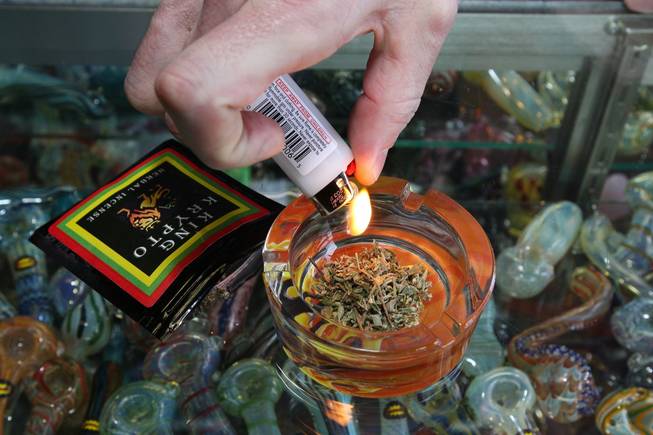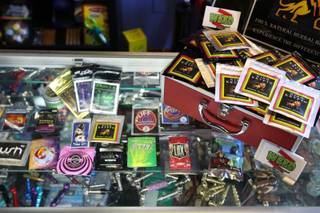
MONA SHIELD PAYNE / SPECIAL TO IN BUSINESS LAS VEGAS
Burning of aromatherapy herbal blends of synthetic marijuana is demonstrated in the downtown shop Weedz Alternatives in April 2010. Weedz went out of business when it lost an appeal to the Las Vegas City Council.
Friday, Dec. 3, 2010 | 2 a.m.
Sun archives
Beyond the Sun
- Newsweek: A scary drug, or just another drug scare?
- CNN: Synthetic marijuana a growing trend among teens, authorities say
- Philadelphia Inquirer: New synthetic marijuana seized by feds in Phila.
- Atlanta Journal-Constitution: Senate scores ban on synthetic marijuana
The forced closing last month of a downtown Las Vegas “bong bar” that sold smokable chemical-laced herbal incense to customers who got high and, in some cases, sick might be the opening salvo of a broader crackdown on the burgeoning fake marijuana trade in Nevada.
When the Las Vegas City Council voted Nov. 17 to deny an appeal from Weedz Alternatives owner Steven Vogt and fine him $2,500, effectively shutting for good his business at 628 Las Vegas Blvd. South, the stated reason was that he created a nuisance.
The products he sold weren’t illegal under federal or state law even though they were thought to mimic marijuana’s active ingredient, THC. But the city received reports that at least five people who smoked the plantlike substances from the store were hospitalized. (UPDATE: State board looks to ban sale, use of synthetic marijuana)
Those reports jibe with emergency room physicians who have treated numerous individuals they believe overdosed on fake pot, school counselors who have noted increased use among teenage students and a drug laboratory that is finding a high percentage of positive tests in Nevada.
Although the chemicals used in synthetic marijuana have existed since the mid-1990s, it wasn’t until this past year that their use in Southern Nevada became a full-blown fad, said Dr. Ross Berkeley, a University Medical Center emergency room physician and director of quality improvement for its emergency department.
“It has reached cult status,” he said. “It spread through word of mouth by people who like to party, and it has reached a critical mass.”
Synthetic pot, in incense form, can be found in smoke shops and herbal stores throughout the state and is available online. Although the stores and websites typically say they don’t sell their products to minors, teens are getting their hands on the incense anyway, just as they do illicit drugs and alcohol.
A week after the city council’s action against Weedz Alternatives, the Drug Enforcement Administration announced a national crackdown on smokable herbal incense that contains any of five chemicals used to create synthetic pot.
The DEA used emergency authority to declare the unauthorized sale or use of these chemicals would be illegal for at least a year once the temporary ban takes effect, which will occur after the agency publishes an announcement in the Federal Register. That could take place as soon as the end of this month. The agency also stated pending further study that it may make that decision permanent, lumping those chemicals with other controlled substances such as marijuana and cocaine that are illegal.
One synthetic marijuana chemical that drug studies in rats and pigeons found to be 66 to 80 times more potent than THC, HU-210, is banned federally. The DEA’s temporary ban includes three chemicals with the initials JWH, named for a Clemson University professor who helped synthesize them.
But some elected officials in rural Nevada, who say fake pot use there is widespread among juveniles and businesses selling the substances are proliferating, won’t wait for the DEA to declare a permanent ban.
They plan to urge the Legislature next year to block the sale or use of synthetic marijuana in Nevada, an initiative that is gaining support among medical professionals in Las Vegas. Fifteen states have bans.
The reason for their concern is that the side effects from smoking fake pot are far more intense and dangerous than the high marijuana produces.
Dr. Lawrence Sands, Southern Nevada Health District’s chief health officer, is among those who said he would support a state ban.
“It does present public health issues in terms of injury, and it’s something someone can become addicted to, something that can change someone’s behavior,” he said.
The Elko County Commission on Nov. 3 passed a resolution urging the Legislature to institute a ban, a request prompted in part by District Judge Andrew Puccinelli, who said more than half of the minors sent through drug court in that rural county this year had tested positive for fake marijuana.
John Ellison, an Elko Republican who is leaving the commission to join the Assembly, agreed to sponsor a bill to ban synthetic marijuana statewide, an idea first pitched by the man he is replacing, longtime Republican Assemblyman John Carpenter.
“I first heard about this from juvenile justice people and judges and it sounded like pretty bad stuff that should be taken off the shelves,” Carpenter said.
Emergency room doctors said users suspected of overdosing on synthetic marijuana have shown up since this summer in area emergency rooms in agitated states or with elevated blood pressure and at least one died of a massive heart attack at Sunrise Hospital and Medical Center. Another patient at UMC tried to jump off his gurney.
Berkeley said he treated four individuals in the past two weeks whom he thinks overdosed on synthetic marijuana. All were in their 20s and two were tourists who had purchased herbs in Las Vegas.
“What the DEA did is a blessing,” Berkeley said. “It’s about time they acted. Synthetic marijuana is probably not as dangerous as cocaine, but it’s certainly more dangerous than marijuana.”
Fellow emergency room physician Dr. Charlie Wang of Sunrise Hospital said he treated three people in recent weeks whom he thinks had overdosed on synthetic pot, including the heart attack victim.
“The simplest approach to synthetic marijuana is to not use it,” Wang said. “People who use it can become very, very ill.”
Privately run laboratories such as Norchem in Flagstaff, Ariz., which has government and private-sector clients, recently began offering tests that can detect fake marijuana chemicals in urine samples. Norchem identified Nevada, along with Arizona, California, Colorado and Kansas, as states where synthetic marijuana use is particularly prevalent.
The Norchem test can detect fake marijuana in urine up to 72 hours after it entered a casual user’s body, but the test also can identify chemicals that have been stored in the fatty cells of chronic users even if they haven’t ingested the synthetic pot in recent days, said Alejandro Garcia, business development director.
Garcia said the ease with which synthetic marijuana can be purchased has made it a hit among teens. Like many sugar-laden, heavily caffeinated drinks, the herbal incense typically comes in colorful packaging with a variety of flavors and eye-catching names such as “Spice,” “Blaze,” “Puff,” “Black Mamba” and “Red X Dawn.” Internet prices for herbal incense run from $5 to $23 a gram. That compares with about $13 a gram (or $375 an ounce) for high-quality marijuana, according to a Rand Corp. report released in July.
“If you can buy beer, you’ll figure out a way to buy Spice,” Garcia said. “It’s a juvenile play right now.”
Confirmation of that came from Dr. Michael Levy, who operates the Center for Addiction Medicine in Las Vegas. Last month, when he sat on a panel of drug treatment experts who were fielding questions from Clark County School District counselors, many of the queries centered on middle and high school students who had experimented with fake marijuana within the past year. Levy wasn’t surprised because many of his adolescent clients had also used synthetic pot.
“It’s specifically labeled as ‘not for human consumption’ but that’s a sham because everyone is using it,” Levy said of the packages, which are labeled for use as incense.
One reason he supports a ban is that “you can’t predict who can have a panic attack” from smoking fake pot.
Mr. Bill’s Pipe and Tobacco Co. in Las Vegas has a website that lists various herbal incenses for sale, including Blaze, which the DEA had identified as a brand that contains chemicals it wants to temporarily ban. The website says the product cannot be shipped to 13 states. Repeated calls seeking comment from the company weren’t returned.
There was also no response to e-mails sent to the maker of another herbal incense, Dami-Max, which is processed in Las Vegas. Its website states: “Many people ask the common and familiar question, ‘Is it good?’ or ‘How does it compare to other products?’ Unfortunately, due to this product’s intended purpose, we at Dami-Max are legally unable to answer or have a discussion about these types of questions.”
But Justin Covillon, owner of Atomic Spice on Sahara Avenue, is not shy about speaking out. Covillon stopped selling roughly half of his herbal incense brands because of the DEA’s announcement, but he said manufacturers have developed products with other JWH chemical strains that won’t be covered by the temporary ban.
“There are at least 12 different strains of JWH, and the DEA is going about this the wrong way,” he said.
Although conceding that some users have abused the incense because they think anything that is legal is also safe, he said the better alternative would be for the agency to maintain the chemicals’ lawful status while requiring the products to clearly state safe doses for human use.
“People are going to get high anyway,” he said.
Spokesmen for Metro, Henderson and North Las Vegas police said they’ll enforce any laws that ban synthetic marijuana. But the issue still isn’t on their radar screens when compared with ridding the valley of higher profile, unlawful drugs.
Officer Jacinto Rivera said Metro will continue to focus on marijuana “grow” operations because they often involve guns and violence.
“If we come across synthetic marijuana, we’ll deal with it, but the bigger issue for us has been the grow houses,” Rivera said.



Join the Discussion:
Check this out for a full explanation of our conversion to the LiveFyre commenting system and instructions on how to sign up for an account.
Full comments policy